- Home
- Hermann Hesse
Klingsor's Last Summer Page 11
Klingsor's Last Summer Read online
Page 11
“How is it going?” he asked at one point.
She was sensitive to interference. “Oh, let me play. I’ll do all right.”
Soon she changed tables. He followed her without her noticing him. Since she was so absorbed and never turned to him for anything, he withdrew to a leather bench along the wall. Solitude descended around him. He began thinking about his dream again. It was very important to understand it. Perhaps he would not have many more such dreams; perhaps, as in fairy tales, they were hints from the good spirits: you were beckoned to twice or thrice, or warned; and if in spite of this you remained as blind as ever, your fate took its course and no friendly power intervened again. From time to time he looked for Teresina, saw her sitting at one table, standing at another. Her yellow hair gleamed brightly among the black dinner jackets.
How long she makes a thousand francs last! he thought, bored. It was faster for me.
Once she nodded in his direction. Once, after an hour, she came over to him, found him abstracted, and placed her hand on his arm.
“What are you doing? Aren’t you playing?”
“I have already.”
“Lost?”
“Yes. Oh, it wasn’t much.”
“I’ve won a little. Take some of my money.”
“Thanks, no more today. Are you enjoying yourself?”
“Yes, it’s lovely. I’m going back. Or do you want to leave already?”
She went on playing; here and there he saw her hair shining between the shoulders of the players. He brought her a glass of champagne and drank a glass himself. Then he sat down again on the leather bench by the wall.
What was that about the two women in the dream? They had been like his own wife and also the woman in the village tavern and also Teresina. He knew no other women, had not for years. He had stabbed the one woman, revolted by her distorted, swollen face. The other had attacked him from behind and tried to strangle him. Which version was correct? Which was significant? Had he wounded his wife, or she him? Would Teresina destroy him, or he her? Could he not love a woman without inflicting wounds on her and without being wounded by her? Was that his curse? Or was that the general rule? Did it happen to everyone? Was all love like that?
And what linked him to this dancer? That he had fallen in love with her? He had fallen in love with many women without ever saying a word about it. What linked him to her who stood over there engaged in her gambling as if it were a serious business? How childish she was in her eagerness, in her hope; how healthy, naïve, and hungry for life she was! How much would she understand if she knew of his deepest longing, the craving for death, the homesickness for extinction, for return to the bosom of God? Perhaps she would love him, perhaps soon, perhaps she would live with him—but would it be any different from what it had been with his wife? Would he not, forever and ever, be alone with his deepest feelings?
Teresina interrupted him. She paused in front of him and put a bundle of banknotes into his hand.
“Keep these for me, till later.”
After a while—he did not know whether the time was long or short—she returned and asked for the money.
She’s losing, he thought. Thank God! I hope she’s finished soon.
Shortly after midnight she returned, pleased and rather flushed. “So, I’m stopping. Poor man, you must be tired. Should we have a bite to eat before we go home?”
In one of the dining rooms they dined on ham and eggs and fruit, and drank champagne. Klein revived and became lively. The girl was transformed, gay and slightly, sweetly intoxicated. She looked and was aware again that she was beautiful and wearing beautiful clothes; she felt the eyes of the men, courting her from adjacent tables. And Klein, too, felt the change, saw her again in her aura of attractiveness and delicious allurement, heard again the note of provocation and sexuality in her voice, and saw her hands emerging white from the lace, and her neck the color of pearls.
“How were your winnings?” he asked, laughing.
“Not bad, though not the jackpot yet. Around five thousand.”
“Well, that’s nice for a start.”
“Yes, I’m going to continue, of course, next time. But I haven’t quite found the right system. It has to come all at once, not in driblets.”
He wanted to say: “Then you should place your stakes all at once, not in driblets.” But instead he clinked glasses with her and drank to fortune on the grand scale, and laughed and chatted away.
How pretty the girl was, how sound and simple in her pleasure. An hour ago she had been standing at the gaming tables, stern, anxious, with wrinkled brow, angry, calculating. Now she looked as if she had never had a care in the world, as if she knew nothing of money, gambling, business, as though all she knew were pleasure, luxury, and effortless skimming on the iridescent surface of life. Was this all true, all genuine? He himself was also laughing, was amused, was courting joy and love with dancing eyes—and yet at the same time there was a person within him who did not believe in all this, who looked on it all with suspicion and mockery. Was that any different for others? You knew so little, so desperately little about other people. You had learned a hundred dates of ridiculous battles and the names of ridiculous old kings in school; you daily read articles about taxes or about the Balkans; but you knew nothing of people. If a bell failed to ring, if a stove smoked, if a wheel on a machine stuck, you knew at once where to look and did so with alacrity; you found the defect and knew how to cure it. But the thing within you, the secret mainspring that alone gave meaning to life, the thing within us that alone is living, alone is capable of feeling pleasure and pain, of craving happiness and experiencing it—that was unknown. You knew nothing about that, nothing at all, and if the mainspring failed there was no cure. Wasn’t it insane?
While he drank and laughed with Teresina, such questions rose and fell in other regions of his mind, now closer to consciousness, now farther away. Everything was doubtful, everything steeped in uncertainties. If only he knew one thing: whether this uncertainty, this distress, this despair in the midst of joy, this compulsion to think and compulsion to question, was present in others also, or whether it was reserved for him alone, for Klein the eccentric?
In one respect, he found, he clearly differed from Teresina; in that respect she was different from him, was childishly and primitively healthy. This girl, like all people and like himself in the past, always instinctively reckoned with a future, with tomorrow and the day after, with continuation. Would she otherwise have been able to gamble and to take money so seriously? And here, he felt deeply, he was a different case. For him, behind every feeling and thought was the sense of the open door leading into nothingness. To be sure, he suffered from dread of many things, of madness, the police, insomnia, and also dread of death. But everything he dreaded he likewise desired and longed for at the same time. He was full of burning curiosity about suffering, destruction, persecution, madness, and death.
“A funny world,” he said under his breath, meaning not the world around him but this inner self. Chatting, they left the casino, walked under the dim lamplight to the sleeping lake shore, where they had to awaken their boatman. It was a while before the boat was ready to leave, and the two stood side by side, transported as if by magic out of the brilliant light and the colorful society of the casino into the dark stillness of the deserted nocturnal shore, their laughter still on their heated lips but already touched with coolness by night, the imminence of sleep, and fear of loneliness. Both of them felt it. Abruptly, they took each other’s hand, smiled wanly and abashedly into the darkness, and each played with dancing fingers on the other’s hand and arm. The boatman called, they stepped in, sat down in the cabin, and with a quick movement he drew her blond head toward him and into the ardor of his kisses.
Fending him off between kisses, she sat up and asked: “Will we be coming over here again soon?”
In the midst of his erotic stirring, he could not help secretly smiling. With it all she was still thinking of the g
ambling; she wanted to come back and carry on her business.
“Whenever you like,” he said, wooing her. “Tomorrow and the day after and every day you wish.”
When he felt her fingers caressing the back of his neck, the memory flashed through him of the terrible feeling in the dream when the vengeful woman clawed at his throat.
“Now she ought to kill me suddenly,” he thought, burning. “Or I her.”
His groping hand closing around her breast, he laughed softly under his breath. It would have been impossible for him to distinguish pleasure from pain. Even his desire, his hungry longing for embrace with the beautiful, strong woman, could scarcely be distinguished from dread. He longed for her like the condemned man for the ax. Both elements were there, flaming desire and inconsolable grief; both burned, both blazed in fevering stars, both warmed, both killed.
Teresina lithely withdrew from an overbold caress, held both his hands tightly, brought her eyes close to his, and whispered rather absently: “What kind of man are you, tell me. Why do I love you? Why does something draw me to you? You’re old already and not good-looking—how is it? Listen, I do think you’re a criminal. Aren’t you? Isn’t your money stolen?”
He tried to wrest free. “Don’t talk, Teresina! All money is stolen, all property is unjust. Is that important? We are all sinners, we are all criminals, merely because we are alive. Is that important?”
She started. “Oh, what is important?”
“It’s important that we drain this cup,” Klein said slowly. “Nothing else is important. Perhaps it will never come again. Will you come to my place to sleep, or may I go with you?”
“Come to me,” she said softly. “I’m afraid of you and yet I must be with you. Don’t tell me your secret. I don’t want to know anything.”
The sound of the motor throttling down aroused her. She wrenched away from him, smoothed her hair and dress. The boat ran softly up against the landing stage. Bands of lamplight splintered in the black water. They clambered out.
“Wait, my bag!” Teresina exclaimed after they had taken ten steps. She ran back to the stage, jumped into the boat, found the handbag with her money lying on the seat, threw the suspiciously blinking boatman one of the bills, and ran back into the arms of Klein, who was awaiting her on the quay.
5
THE SUMMER HAD SUDDENLY BEGUN. In two hot days it had changed the world, thickened the woods, enchanted the nights. Hour pressed torridly upon hour; the sun ran swiftly through burning half-circles, the stars following it hurriedly. A fever of life flared. A silent, greedy haste beset the world.
An evening came when Teresina’s dance in the Rose Garden was interrupted by furious claps of thunder. The lanterns went out; startled faces grinned at one another in the white flashes of lightning; women screamed, waiters shouted, windows rattled.
Klein had at once drawn Teresina over to the table where he sat beside the old comedian.
“Splendid!” he said. “Let’s go. You’re not afraid?”
“No, not afraid. But I won’t let you stay with me tonight. You haven’t slept for three nights and you look terrible. Take me home and then go to your hotel to sleep. Take Veronal if you need it. You’re living like a suicide.”
They left, Teresina in a coat borrowed from a waiter, and tramped through the wild wind and flashes of lightning and the howling whirls of dust down streets swept clean. Bright and jubilant, the heavy thunderclaps boomed through the tumultuous night. Suddenly the rain roared down, splashing on the pavement, gushing furiously with sobs of release into the thick summer foliage.
Soaked and shivering, they reached the dancer’s apartment. Klein did not push on to his hotel; nothing more was said of that. With a sigh of relief they entered the bedroom, laughing, shed their soaked clothes. The glaring flashes of lightning pulsed through the windows; the wind and rain plucked at the acacias.
“We haven’t been back to Castiglione yet,” Klein said mockingly. “When are you going?”
“We’ll go again, count on that. Are you bored?”
He drew her close; both were in a fever and the afterglow of the thunderstorm flamed in their embrace. In gusts the chilled air came through the window, with the bitter smell of leaves and the leaden smell of earth. Out of the bodily combat both quickly dropped into slumber. His wasted face lay on the pillow beside her fresh face, his thin, dry hair beside her thick, lovely hair. Outside the window the last flashes of the thunderstorm glimmered, slacked, and ceased. The wind died down. Serenely, a still rain flowed down into the trees.
Soon after one o’clock Klein awoke from a heavy, sultry confusion of dreams—he never slept long any more. His head thudded, his eyes smarted. He lay motionless for a while, eyes wide open, recollecting where he was. It was night, someone was breathing beside him; he was with Teresina.
Slowly, he sat up. Now the torments were coming again; now he was condemned to lie hour upon hour, anguish and dread in his heart, alone, suffering useless pangs, thinking useless thoughts, fretting over useless cares. Out of the nightmares that had awakened him crawled greasy, hulking feelings, disgust and horror, surfeit, self-contempt.
He groped for the light and switched it on. The cool brightness flowed over the white pillow, over chairs heaped with clothes. The gap of the window hung blackly in the narrow wall. Shadows fell over Teresina’s averted face; her neck and hair gleamed.
In the past he had sometimes seen his wife lying that way beside him. Sometimes he had also lain sleepless at her side, envying her sleep, feeling mocked by her satiated, contented breathing. Never were you so utterly, so totally abandoned by one closest to you as when that person slept. And again, as so often, there came to his mind the image of the suffering Jesus in the garden of Gethsemane where he was choking with the fear of death but his disciples slept, slept.
Gently, he drew the pillow more to his side, together with Teresina’s sleeping head. Now he saw her face, so alien in sleep, so utterly absorbed, so utterly turned away from him. One shoulder and breast lay exposed; under the sheet her abdomen rounded softly with each breath. Odd, he thought, how in speaking of love, in love letters and love poems, people always talked of sweet lips and cheeks, and never of bellies and legs. Fraud! Fraud! He studied Teresina for a long time. With her lovely body, with those breasts and those white, strong, healthy arms and legs, she would still tempt him often and embrace him and derive pleasure from him and then rest and sleep deeply, satiated, without pain, without dread, without foreboding, beautiful and torpid and stupid as a healthy, sleeping animal. And he would lie beside her, sleepless, with fluttering nerves, his heart full of torment? Often? Often? Oh no, no longer often, not many times more, perhaps nevermore. He gave a start. No, he knew it was true: nevermore.
Groaning, he bored his thumb into his eye socket between eye and brow, where these devilish pangs were located. Undoubtedly Wagner had also had these pangs, his teacher Wagner. Surely he had had them, these insane pains, for many years, and had endured them and thought they were making him ripen and bringing him closer to God when all the while they were only useless tortures. Until one day he could no longer endure it—just as he, Klein, could no longer endure it. The pain was the least of it, of course, but the thoughts, the dreams, the nightmares! And then one night Wagner had sprung up and had seen that there was no longer any sense to adding more, many more such nights of torture to one another, that they did not bring him any closer to God, and he had gone for the knife. Perhaps it was pointless, perhaps foolish and ridiculous of Wagner, to have killed. Those who did not know his torments, those who had not suffered his pain, could not understand it, of course.
Only recently he himself had stabbed a woman in a dream because her distorted face had been unbearable to him. But of course everything you loved was distorted, distorted and cruelly provoking when it no longer lied, when it was still, when it slept. Then you looked to the bottom of it and saw no sign of love in it, as you found no sign of love when you looked to the bottom of your
own heart. There was only greed for living and dread, and out of dread, out of stupid childish dread of the cold, of loneliness, of death, two people fled to one another, kissed, embraced, rubbed cheek to cheek, put leg to leg, cast new human beings into the world. That was how it was. That was how he had once come to his wife. That was how the innkeeper’s wife in a village had come to him, once upon a time, at the beginning of his present course, in a bare stone chamber, barefoot and silent, driven by dread, by greed for living, by need of comfort. That was how he had come to Teresina and she to him. It was always the same instinct, the same craving, the same misunderstanding. And it was also always the same disappointment, the same fierce suffering. You thought you were close to God and held a woman in your arms. You thought you had achieved harmony and had only shifted your guilt and your sorrow to a distant, future being. You held a woman in your arms, kissed her mouth, stroked her breast and begot a child with her, and some day the child would be caught up by the same fate, would likewise lie beside a woman some night and likewise awaken from the frenzy and stare with aching eyes into the abyss and curse the whole thing. Unbearable, to think this thought through to the end.
Attentively, he studied the sleeping girl’s face, her shoulder and breast, her yellow hair. All that had delighted him, deceived him, allured him, all that had lied to him of pleasure and happiness. Now it was over, now came the reckoning. He had entered Wagner’s theater; he had realized why every face, as soon as the illusion collapsed, was so distorted and unendurable.
Klein got up from the bed and went to look for a knife. As he stole along he brushed Teresina’s long, tan stockings from the chair—and in a flash remembered how he had seen her for the first time, in the park, and how her gait, her shoe, and her taut stocking had sent the first stirrings through him. He laughed softly, with a gloating undertone of malice, and picked Teresina’s clothes up piece by piece. He felt them and let them drop to the floor. Then he continued his search, but at moments forgetting everything again. His hat lay on the table; he took it thoughtlessly, turned it in his hands, felt that it was wet, and put it on his head. At the window he paused, looked out into the blackness, heard rain singing; it sounded a note of distant, forgotten times. What did all this mean to him, window, night rain—what concern was it of his, this old picture book of his childhood days.

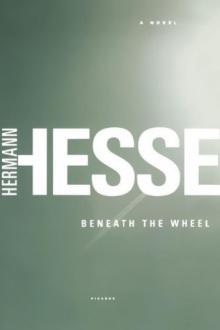 Beneath the Wheel
Beneath the Wheel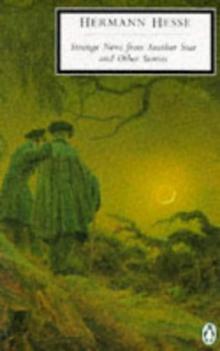 Strange News From Another Star
Strange News From Another Star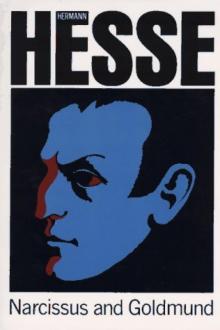 Narcissus and Goldmund
Narcissus and Goldmund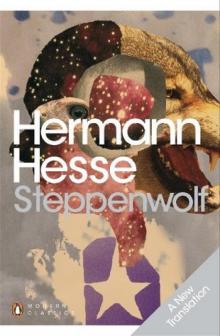 Steppenwolf
Steppenwolf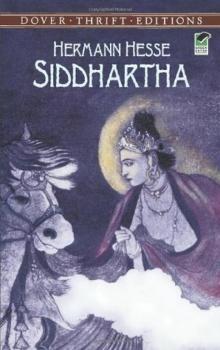 Siddhartha
Siddhartha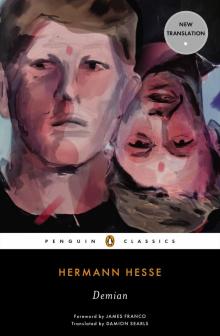 Demian
Demian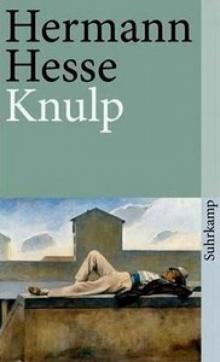 Knulp
Knulp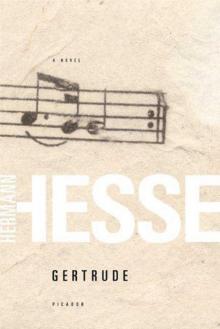 Gertrude
Gertrude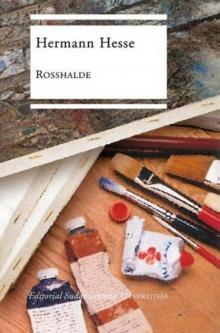 Rosshalde
Rosshalde The Glass Bead Game
The Glass Bead Game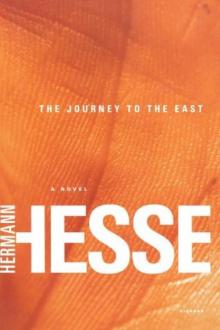 The Journey to the East
The Journey to the East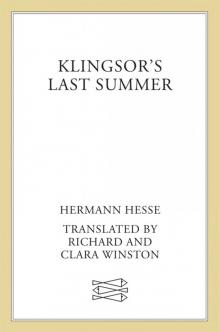 Klingsor's Last Summer
Klingsor's Last Summer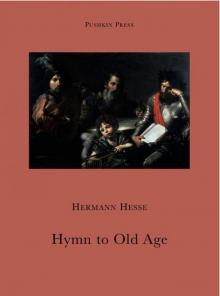 Hymn to Old Age
Hymn to Old Age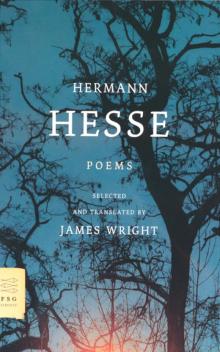 Poems
Poems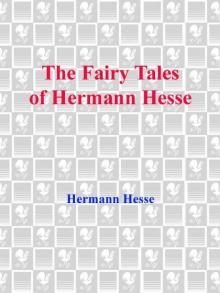 The Fairy Tales of Hermann Hesse
The Fairy Tales of Hermann Hesse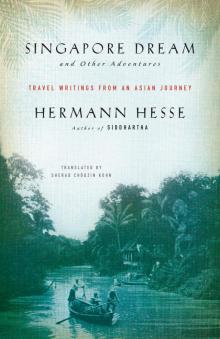 Singapore Dream and Other Adventures
Singapore Dream and Other Adventures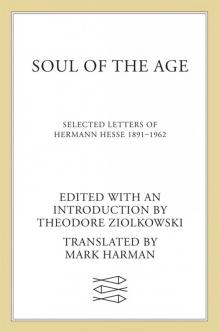 Soul of the Age
Soul of the Age